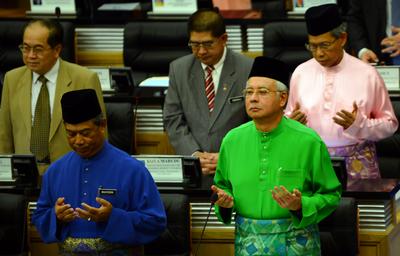Such measures have the added bonus of filling the electorate with confidence in the country’s financial situation.
The government has adopted various measures to encourage consumption. The salaries of public-sector employees have been increased and various segments of the population have been targeted with grants and cash handouts. There has been no attempt to curb subsidies, despite pious talk only a year ago of the need to get rid of the culture of subsidisation. These measures have no doubt contributed to increased consumption.
Despite earlier announcements that it would encourage economic participation from the private sector, the government has again put itself in charge of Malaysia’s economy. For example, projects under the government’s Economic Transformation Programme (ETP) place responsibility for economic activity in the hands of the government. The ETP involves government-linked companies (GLCs), which, while hotly debated, are not vastly different from what are called state-owned enterprises in other countries.
The Tun Razak Exchange (TRX), which is the government’s planned attempt to launch a new financial district in the capital city, is a striking example of repeatedly using well-worn strategies that have not always worked. The TRX has a gross development value of RM26 billion (US$8.5 billion), and will offer fiscal incentives that include 100 per cent tax exemption. It aims to transform Kuala Lumpur into the region’s financial hub, and one of the 20 most liveable cities in the world. As is typical of such a large project as this, the TRX will be spearheaded by 1Malaysia Development Berhad, a wholly government-owned strategic development agency.
These initiatives aim to boost investor confidence and public investment, which lead to higher economic growth.
Meanwhile, the federal debt ceiling was raised from 45 per cent to 55 per cent of GDP in July 2009, a ratio which the government has promised to maintain. Fitch Ratings points out that Malaysia’s debt-to-revenue ratio resembles that of Italy — not a comforting comparison. And that is because revenues are not increasing in line with debt.
So why does Malaysia seem to delight in fiscal dare-devilry?
First, Malaysia is obsessed with economic growth. It is thought that whatever happens, it is the government’s responsibility to deliver high growth rates. Often this is at the cost of attending to other structural issues such as income distribution, corruption, crime, and education.
Second, fiscal indiscipline is the shortest route to immediate tangible economic success. The Keynesian principle of increasing government spending to come out of a recession is abused when excessive spending is undertaken outside of a recession. But even when government spending is not backed by adequate revenue, it does stimulate growth. It gives the semblance of strong growth and a vibrant economy when the fundamentals may be less solid. False claims of economic prowess can be made even when the economy is not as robust as it is made out to be.
Third, fiscal indiscipline is an economic strategy that has been practised for the last 30 years with no disastrous effects, so it remains in the arsenal of the Malaysian government — it has become something of a quick fix.
Fourth, with the elections coming up, anything goes. It is thought to be necessary to paint a rosy picture of the economy, and to have a stock market that is doing well. This is the wrong time to admit to weakness.
Finally, the generous spending that the government has undertaken in recent times could be a pre-emptive measure to soften the blow that will come from a global slowdown.
So what will the government do if a slowdown strikes? Commit to another round of spending? The gamble is that the slowdown will not be severe and that even if a stimulus package will have to be executed it will be manageable.
At any rate, the government has enough foreign exchange reserves and its current account surplus is high. The banking system is not short of liquidity. This gives the government room to take chances with confidence. To date there has been little need for foreign borrowing, as the Malaysian government can afford to finance its deficits through Malaysian Government Securities. This is further ground for self-assurance that verges on recklessness.
The question, however, is whether fiscal wagers of this sort are compatible with a sustainable economy. Are prudence and caution unfashionable values as far as fiscal management is concerned?
Shankaran Nambiar is an economist who consults for national and international agencies. He lives in Kuala Lumpur. A previous version of this article appeared in the Edge Financial Daily.

